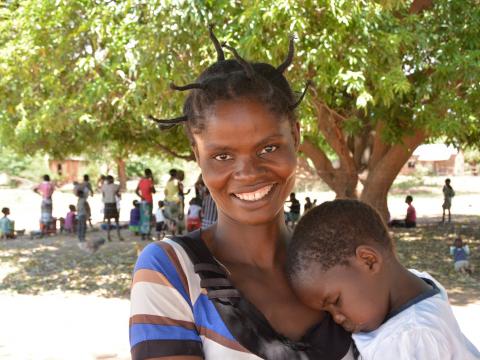Combatting child malnutrition in Zambia through food assistance and immunization

“The immunisation my child has received will help him grow up a healthy child. It gives him an assurance to his promised future,” says Bettina Siamalile, 36 and mother of four. Bettina is among hundreds of mothers and their children who have come to Gwembe Valley Development Rural Health Centre in Sinazongwe for Child Health Week.
World Vision was providing Vitamin A, Mebendazole, and Albendazole tablets for the programme. “Without these supplies, the programme is in vain; immunisation without Vitamin A and the deworming tablets is incomplete because these are important for children,” says Monde Simwemba, the nurse at the health centre.
“I thank World Vision for providing the medicines. I don't think my children can dream of a better future without being protected from diseases,” says Bettina. “I would be a sad mother if my child suffered from sight problems or die from a disease caused by worms.” Monde says the problem of sight and worms in Zambia is real and if not addressed while children are small, it could negatively affect the country in many ways.
“World Vision and the Zambian government’s commitment to promoting immunisation is the best way to save the future of these children,” says Monde. Bettina is grateful to World Vision donors for providing the deworming tablets and Vitamin A supplements. “All my children never miss immunisation because I have consistently been bringing them to the centre where they received deworming tablets and Vitamin A”, she adds.
“Your assistance is saving our children’s lives. Without it the children will have a lot of problems with diseases and can even die if they are not immunised,” says Bettina. She learned through the health activities that her children may become blind if not given Vitamin A and that worms can cause malnutrition if they are not dewormed.
“The Child Health Weeks enable under-5 children to get immunised, weighed, monitored for growth, dewormed and to receive Vitamin A supplements”, says Monde, adding, “Vitamin A is not just good for improved eye sight but also improves child’s growth. Children are more vulnerable to worms because they often play outside. If children are not dewormed they eat the nutrients in the child’s body leading to malnutrition.” She added that Albendazole and Mebendazole are important during immunisation periods.
Other than providing the deworming tablets and Vitamin A supplements that support the programme throughout Zambia, World Vision also assists with logistics to distribute them to remote areas. In 2016 alone, World Vision provided deworming and Vitamin A tablets worth US$5,400,000 to Zambia’s Ministry of Health, which is the implementing partner.
On the same year, World Vision also supported the Ministry of Health Gift-in-Kind (GIK) medical supplies such as baby cribs, theatre equipment and supplies, delivery beds, linen and other materials worth over US$22,500,000 thereby saving lives of thousands of people country-wide. Meanwhile
Mwauluka Mwauluka said that as World Vision responded to provide food assistance to affected families on last year’s drought, the programme complemented the efforts to end malnutrition through the Realigning Agriculture and WASH for Nutrition (RAGWANUT) project. The project enhanced food security at household level following the favorable rainfall on the 2016-2017 farming season.
“There is a vicious cycle around the child that leads to death; that is malnutrition which requires tackling in all angles that World Vision has identified to save children’s lives especially during drought. Supporting children’s immunisation is one of them and enhancing food security at household level is another,” says Mwauluka.
“The first 1000 days of a child are critical to save life. As a result deworming and better feeding of children through enhanced food security and provision of water, hygiene and sanitation are what World Vision have strengthened to address diseases like malnutrition.”
Mwauluka, who is the RAGWANUT Development Facilitator for Sinazongwe says emphasis on integrated programming to address hunger, malnutrition and other diseases like diarrhoea which lead to malnutrition is important to break the malnutrition vicious cycle that can end the child’s life.
“For example even if a child eats nutritious food such as orange maize, rich in Vitamin A and the Mbereshi beans, rich in proteins, which World Vision is encouraging farmers to grow, it would be a waste of resources without supporting the immunisation programme that carries along the deworming of children,” says Mwauluka.
“One of the underlining factors of malnutrition is gastro intestinal disease which affects absorption of nutrients in child’s body due to diarrhoea and worms that feast on the nutrients while in the intestines,” he says.
Mwauluka says this is why in addition to enhancing food security and household level, World Vision is providing of clean water and promoting hygiene and sanitation (WASH) because they are critical to prevent diarrhoea when children drink contaminated water and when hygiene and sanitation levels are poor in the communities.
“Just as what the worms can do, a child also loses nutrients when they suffer from diarrhoea, leading to malnutrition, stunted growth and even death,” he says. He concluded that through implementation of WASH, immunisation programmes, promotion of crop diversification and conservation farming, World Vision is reducing malnutrition levels in Zambia.


